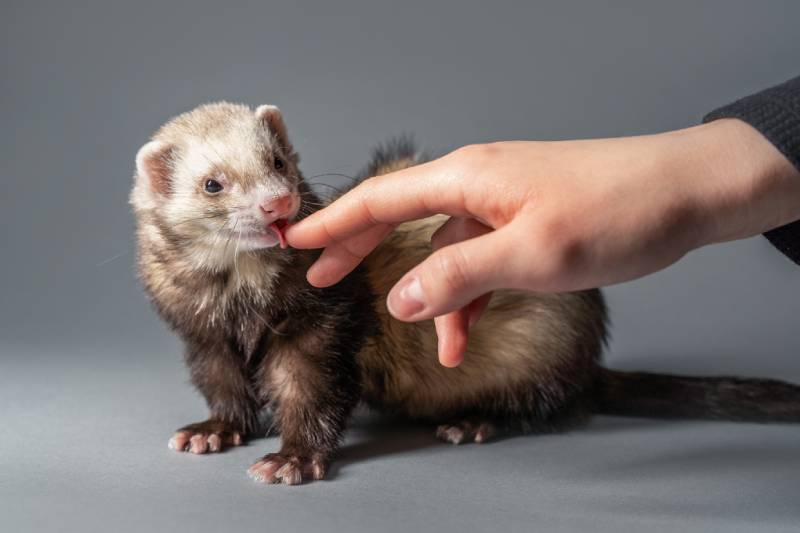Are Ferrets Smart? Intelligence Explained
Updated on

Ferrets are domesticated animals belonging to the Mustelidae family, recognized by their long and slender bodies. They are small at only 14 inches long and are kept as exotic pets. People often don’t see these small pets as smart, considering many of them are pests in different parts of the world. Domestic ferrets are not found in the wild, so their intelligence is based on how they are as pets.
How Smart Are Ferrets?
Compared to other animals, ferrets are inherently smart. Their intelligence is similar to other domesticated animals like dogs and cats. Ferrets are domesticated animals that show many intelligent behaviors.
The wild ancestors of ferrets, the European polecat, is considered a pest to farmers because they damage crops. Pest animals are generally seen as a nuisance and their intelligence level is often ignored. Ferrets have been domesticated for over 2,000 years, so humans are well acquainted with ferret behaviors and intelligence.

The 5 Pillars of Ferret Intelligence
Ferrets are smart animals with impressive problem-solving skills, self-awareness, working memory, and good communication skills. Those cognitive abilities are a sign of a ferret’s intelligence, so we will discuss more on those topics below.
1. Problem-Solving Skills
One of the first signs of an intelligent animal is their cognitive ability to solve problems. This would indicate that the animal has a functional prefrontal cortex, a part of the brain responsible for problem-solving, decision-making, and general intelligence. Ferrets can creatively solve puzzles and mazes, usually if their food is offered as a reward.
Furthermore, ferrets can recall certain places or activities linked to a positive or negative outcome and repeat the behaviors when necessary. This is why ferrets can expertly get into things or escape even if you try to restrict them.
2. Trainability
Ferrets are eager to learn new things, which is why training a ferret isn’t challenging. They can be trained to use a litterbox similar to how a cat or rabbit would. Ferrets can quickly learn a new command and repeat it even months after they have learned it. However, that doesn’t mean that all ferrets are easy to train, as some take longer to learn things than others. Most ferrets respond well to basic training commands and enjoy being praised or rewarded with food when they get it right.

3. Memory
Generally, having good working memories can be a sign of animal intelligence. An animal’s memory goes hand-in-hand with other cognitive abilities like problem-solving and communication. Different parts of a ferret’s brain are responsible for memory retention, including the hippocampus, amygdala, cerebellum, and neocortex.
The hippocampus helps ferrets to store and retrieve memories, similar to humans. The amygdala allows ferrets to link emotions to their memories, such as fear or happiness, whereas the cerebellum helps ferrets remember certain movements linked to memories. Ferrets have a larger neocortex than mice, which is responsible for different types of memory-based learning and semantic memories.
Ferrets can form memories based on different experiences and emotions and recall them later on. They can understand that by using the litterbox, they are doing something good and reward-worthy. This also means that if your ferret has a negative experience, they might avoid engaging in the behavior that caused it.
4. Communication Skills
Ferrets are naturally social animals that communicate through scent, body language, and vocals. However, their scent communication is reserved for other ferrets since humans cannot understand it. Ferrets can make different sounds to express certain emotions, usually happiness or fear. Like dogs, ferrets can make a high-pitched barking sound when they feel threatened. They will often hiss or squeak when they feel discomfort or scared.
Another non-verbal way that ferrets can communicate with humans is through body language. Ferrets will puff up their tail showing they are scared, or hiss and bare teeth. When a ferret is feeling playful and content, they may hop around and wag their tails.

5. Self-Awareness
Animals that can separate their own physical and mental characteristics from the outside world are considered self-aware. This can be a sign of an animal’s intelligence and consciousness level, and the ferret is no exception. A study argued whether ferrets might be self-aware of their body size when passing through different-sized holes. The researchers found that the ferrets would match their body size to the holes to determine which ones they could pass through.
What Do Experts Say?
Various parts of a ferret’s brain are linked to intelligence in other animals and humans. Researchers found that ferrets show characteristics observed in advanced primates like humans and non-humans. Ferrets have a folded or wrinkled cerebral cortex, an indication of intelligence through increased brain surface area and volume. The cortical folding is responsible for more complex cognition and neuron connections. Interestingly, the researchers found that the ferret’s cortical folds are similar to cats and other carnivorous animals.

Final Thoughts
Ferrets are known for being many things, such as troublesome, flexible, and curious. The word “intelligent” is rarely used to describe ferrets, although it should be. Ferrets are smart animals with a similar intelligence level to other popular pets such as cats. They can solve complex problems, retain information in their working memories, and communicate with both humans and other ferrets. These are all signs of an intelligent animal and part of the reason ferrets make such good pets.
See Also:
- What Is a Group of Ferrets Called? Info & Facts
- 100+ Funky Ferret Names: Ideas for Your Furry Friend
Featured Image Credit: Couperfield, Shutterstock










